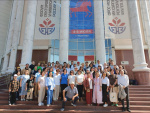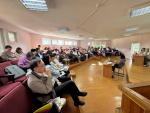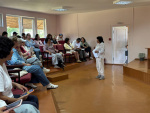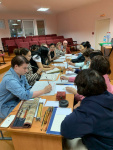10July2025
First International Summer Linguistic School on Lake Baikal "Ethnocultural and Linguistic Space of Cross-Border Regions: History and Modernity" (LSS 2025)
From July 1 to 5, 2025, the First International Summer Linguistic School on Lake Baikal "Ethnocultural and Linguistic Space of Cross-Border Regions: History and Modernity" (LSS 2025) was held at the "Baikal" base of the Banzarov Buryat State University in Maximikha, Barguzin District.
The Summer Linguistic School (LSS 2025) brought together over 80 researchers from foreign countries (Turkey, Tajikistan, Mongolia, China) and various regions of Russia (Tatarstan, Yakutia, Tuva, Altai, Khakassia, Kalmykia, Transbaikal Territory, Buryatia, Irkutsk Oblast, etc.), as well as major cities (Moscow, St. Petersburg, Kazan, Novosibirsk, Chita, Yakutsk, Mirny, Abakan, Kyzyl, Tyumen, Yoshkar-Ola, etc.).
The event gathered linguists from academic institutions, including:
-
The Research Center for National-Language Relations at the Institute of Linguistics, Russian Academy of Sciences (Moscow);
-
Nearly the entire Siberian Languages Sector of the Institute of Philology, Siberian Branch of the Russian Academy of Sciences (Novosibirsk);
-
The Linguistics Department of the Institute for Mongolian, Buddhist, and Tibetan Studies, Siberian Branch of the Russian Academy of Sciences (Ulan-Ude);
-
The Center for Sociolinguistic Research at the Institute for Humanitarian Research and Indigenous Studies of the North, Siberian Branch of the Russian Academy of Sciences (Yakutsk);
-
The Ibrahimov Institute of Language, Literature, and Art of the Tatarstan Academy of Sciences, among others.
Participants also represented higher education institutions, such as:
-
Mongolian State University;
-
National Research University Higher School of Economics (Moscow);
-
Banzarov Buryat State University;
-
Khakass State University;
-
North-Eastern Federal University, and others.
The thematic scope of LSS 2025 covered a wide range of issues related to modern philological studies of cross-border regions in the East amid global transformations. The program included lectures, workshops, training sessions, masterclasses, roundtables, and thematic discussions.
A highlight was the scientific lecture "Regional Sociolinguistics in Historical-Linguistic Perspective: Framing the Problem" by A.P. Mayorov, Doctor of Philology, Professor, and Leading Researcher at the Vinogradov Russian Language Institute of the Russian Academy of Sciences (Moscow) and Banzarov Buryat State University (Ulan-Ude).
The expert discussion "Criteria for Evaluating Research Outcomes and Promoting Academic Journals in Modern Conditions" resulted in a memorandum addressing the support of academic journals (moderated by E.A. Bardamova, Doctor of Philology, Associate Professor at BSU, Editor-in-Chief of BSU Bulletin. Philology).
The panel discussion "Traditions and Innovations in 21st-Century Lexicography: Finding the Optimal Balance" (moderated by E.V. Sundueva, Doctor of Philology, Senior Researcher, IMBT SB RAS) featured masterclasses by:
-
O.R. Hisamov (Doctor of Philology, Professor, Ibrahimov Institute, Tatarstan Academy of Sciences) on "Electronic Catalog of Toponyms of the Republic of Tatarstan: Principles, Functionality, and Development Prospects";
-
L.D. Badmaeva (PhD, Leading Researcher, IMBT SB RAS, Head of the "Electronic Corpus of the Buryat Language" project) on "The Buryat Corpus: Today and Tomorrow".
A lively discussion followed on AI applications in lexicography (moderated by O.R. Hisamov).
As part of LSS 2025, the V Sociolinguistics School-Seminar "Ethnomediaspace and Languages of the Russian Federation" was held to mark the 75th anniversary of the Institute of Linguistics, RAS (moderators: V.G. Radnaev, Director of Buryad TV; A.N. Bitkeeva, Head of the Research Center for National-Language Relations, Institute of Linguistics, RAS). Notable presentations included:
-
Journalist S. Smolyaninov (Ariг Ус TV) on "Regional Television and Ethnomediaspace";
-
Ch.N. Gavriliev (Yakutsk) on "Media Consumption Transformation and the Role of Media in Language Preservation: The Case of the Sakha Republic".
Participants also took part in filming for the series "Linguistic Horizons" on the languages of Russia (Buryad TV). For more details, visit: Ariг Ус TV.
Five roundtables were held during the school:
-
"The Russian World in Cross-Border Space: Strategies of Linguistic and Ethnocultural Interaction" (moderators: G.A. Dyrkheeva, IMBT SB RAS; A.N. Bitkeeva, Institute of Linguistics, RAS);
-
"Mongolian Languages in Historical-Linguistic Perspective" (moderators: P.P. Dambueva, Institute of Linguistics, RAS; D.Sh. Kharanutova, BSU);
-
"Turkic-Mongolian Language Areas of Siberia: Syntax" (moderator: A.A. Ozonova, Institute of Philology, SB RAS);
-
"Turkic-Mongolian Language Connections" (moderator: M.D. Chertykova, Khakass State University);
-
"Interaction of Turkic Languages with Other Structurally Different Languages" (moderator: O.Kh. Kasimov, Tajik International University of Foreign Languages).
The phonetics-phonology section was highly productive (moderator: L.D. Radnaeva, BSU).
Book presentations included:
-
Russian Old-Timers of Mongolia in Memoirs, Essays, and Photographs (Moscow, 2024) by D.B. Sundueva and A.N. Bitkeeva;
-
The Russian Language in Mongolia (Ulan-Ude, 2023) by G.A. Dyrkheeva, Ts. Sarantsatsral, and Ch.S. Tsybenova;
-
Description of the Origin of Indigenous Languages in Eastern and Western Siberia: Texts and Contexts (ed. O.V. Trofimova).
Beyond academic work, participants enjoyed cultural excursions across the Barguzin Valley (including the Lik of Goddess Yanzhima and Suvinskaya Saxony), the Chivyrkuisky Bay, and Ulan-Ude (visiting the Ivolginsky Datsan and a performance by the Baikal Song and Dance Ensemble).
Each morning began with ethnic exercises, while evenings featured ethno-disco, songs by the bonfire, and heartfelt farewells.
Participant Testimonials
-
O.R. Hisamov (Tatarstan Academy of Sciences): "The 1st International Linguistic School on Baikal was an outstanding success! A true celebration of linguistic science and exemplary organization. Our deepest gratitude to the organizers!"
-
A.A. Ozonova (Institute of Philology, SB RAS): "Thank you for the warm, friendly atmosphere and high academic level."
-
L.A. Abukaeva (Mari State University): "The program was rich and inspiring, fostering new collaborations and projects."
Participants received certificates of advanced training.
The Summer Linguistic School on Baikal served as an exceptional platform for exchanging ideas and addressing key issues in the study of cross-border ethnocultural and linguistic spaces through modern approaches.
.jpeg)
.jpeg)
.jpeg)




